Notebook of Gerard Henderson Cowan - Part 7
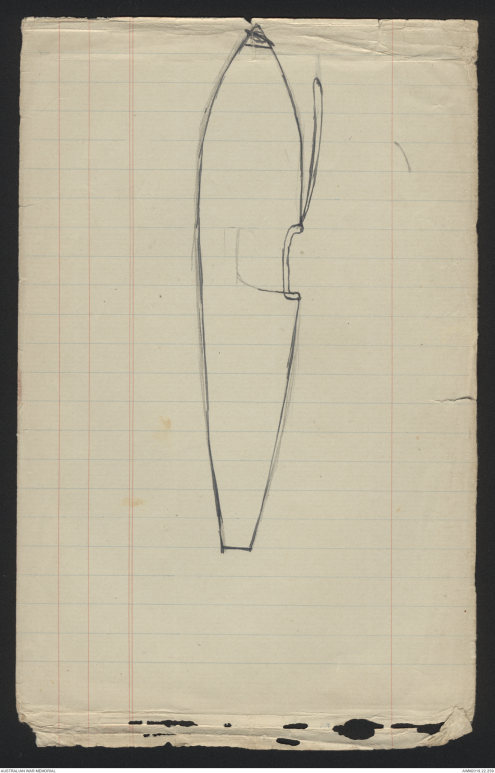
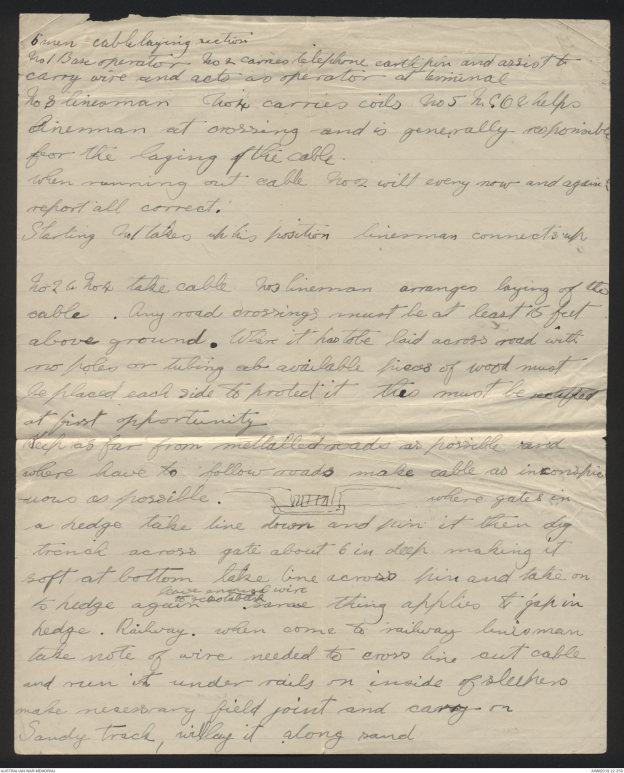
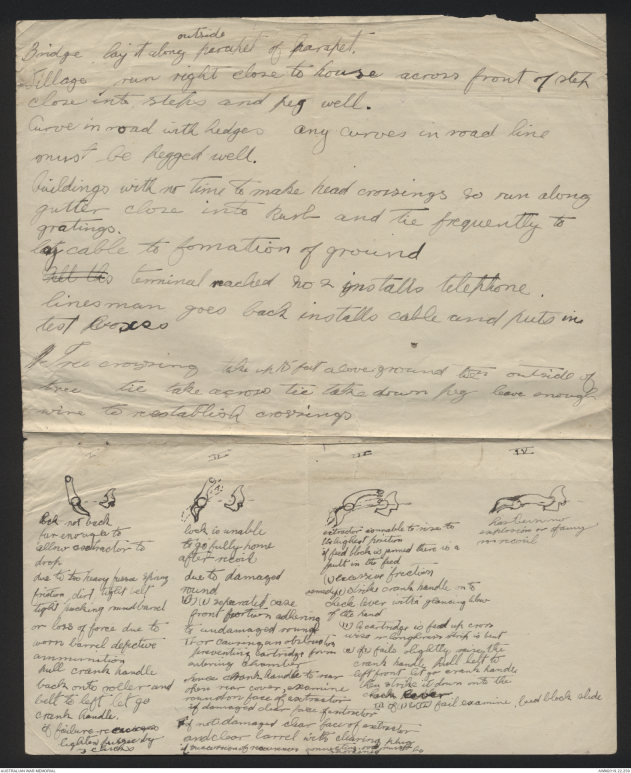
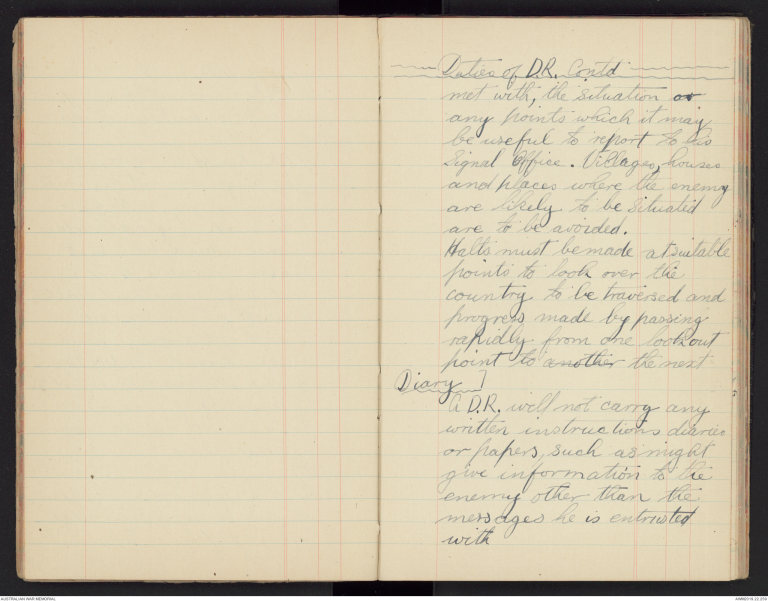
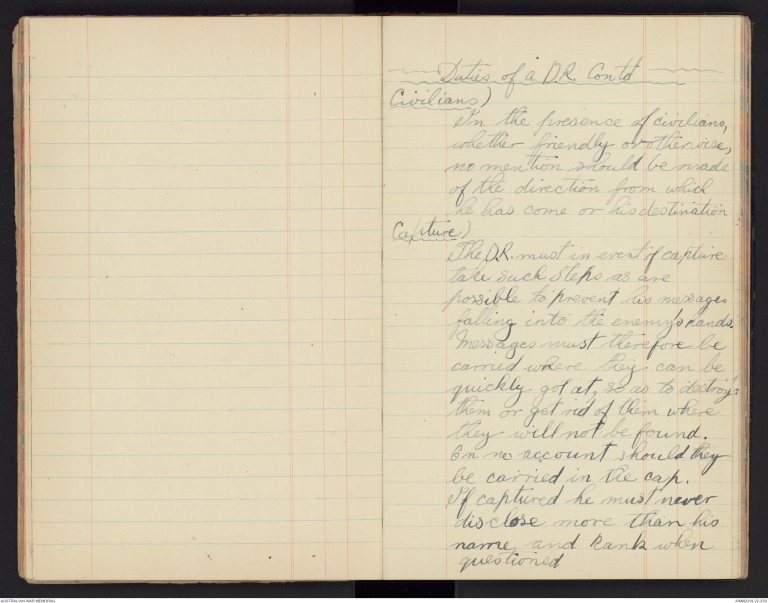
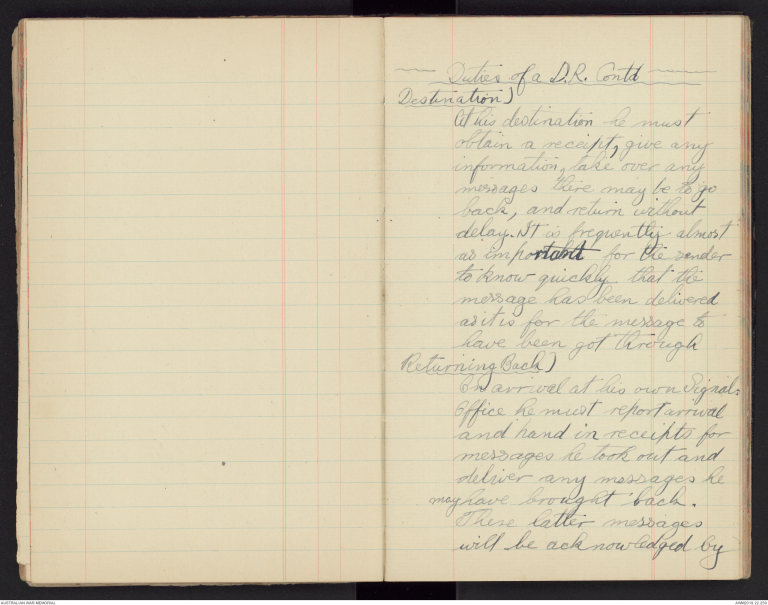
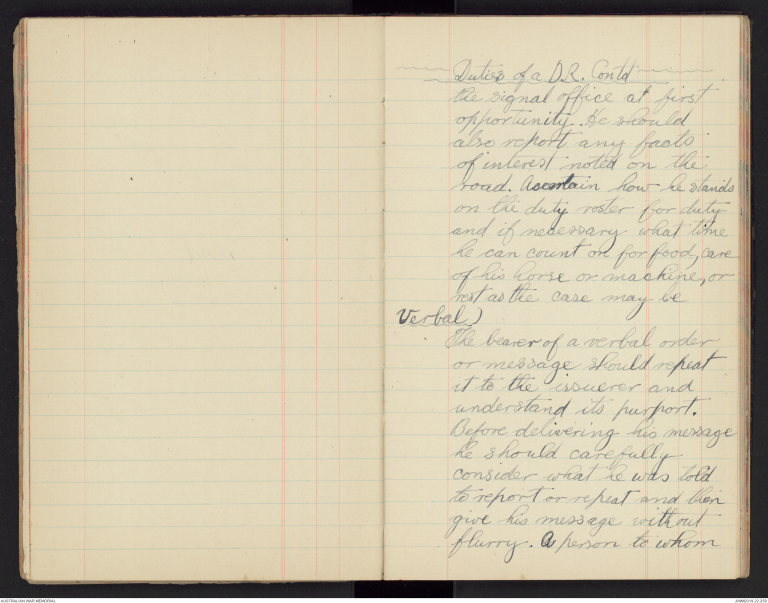
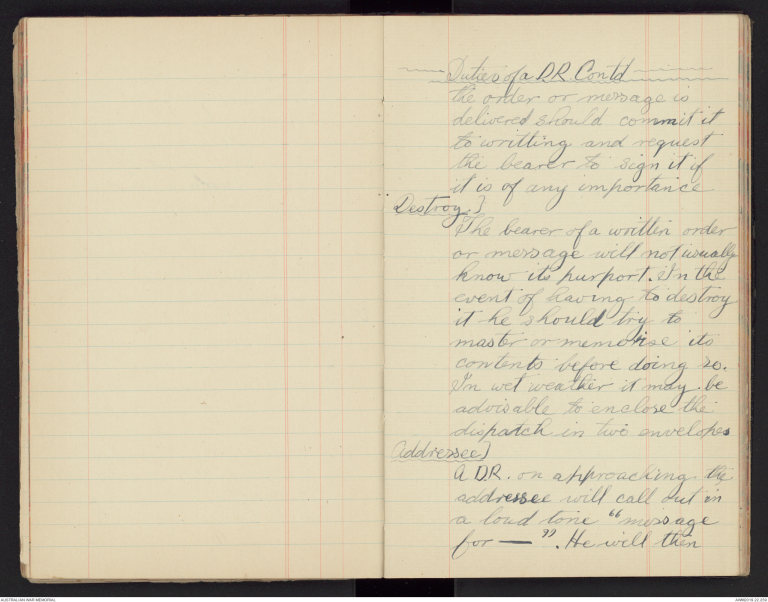
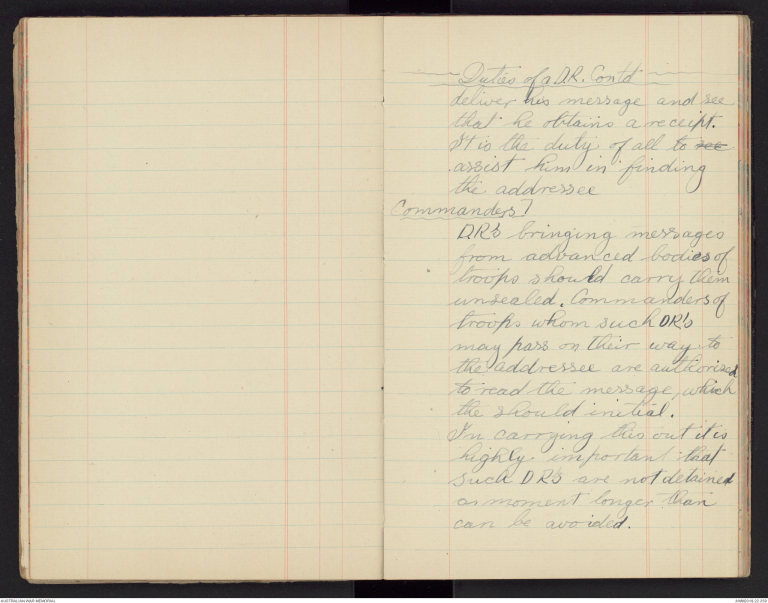
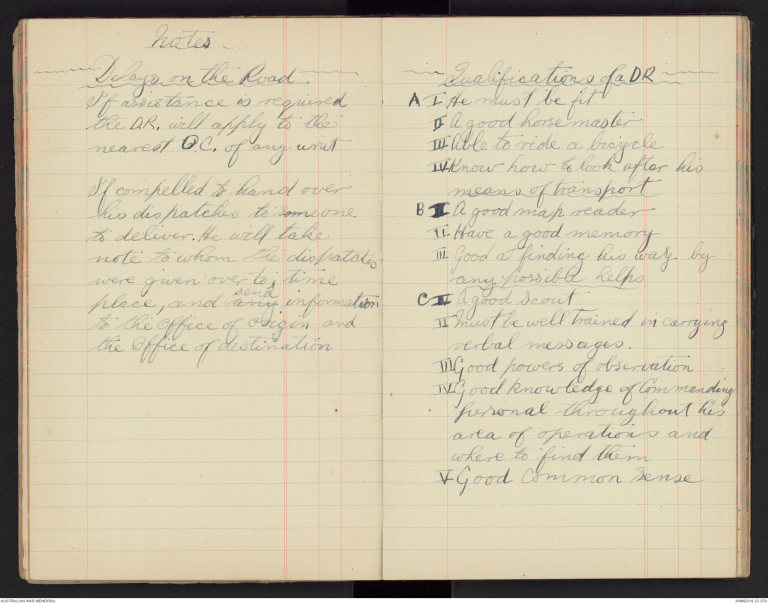
Hand drawn picture- see original document
6 men cable laying section
No 1 Base operator No 2 carries telephone earth pin and assistto
carry wire and acts as operator at terminal
No 3 linesman No 4 carries coils No 5 N.C.O & helps
linesman at crossing and is generally responsible
for the laying of the cable.
When running out cable No 2 will every now and again
report all correct.
Starting No 1 takes up his position linesman connects up
No 2 & No 4 take cable No 3 linesman arranges laying of the
cable. Any road crossings must be at least 15 feet
above ground. Where it has to be laid across road with
no holes or tubing ab available pieces of wood must
be placed each side to protect it this must be rectified
at first opportunity
Keep as far from metalled roads as possible and
where have to follow roads make cable as inconspicuous
as possible. [* Hand drawing*] where gates in
a hedge take line down and run it then dig
trench across gate about 6 in deep making it
soft at bottom take line across run and take on
to hedge again ∧ leave enough wire to reestablish. same thing applies T'graph in
hedge. Railway. when come to railway linesman
take note of wire needed to cross line cut cable
and run it under rails on inside of sleepers
make necessary field joint and carry-on
Sandy track, will lay it along sand
Bridge lay it along outside parapet of parapet.
Village run right close to house across front of step
close into steps and peg well.
Curve in road with hedges any curves in road line
must be pegged well.
Buildings with no time to make head crossings so run along
gutter close into kurb and tie frequently to
gratings
lay cable to formation of ground
All this terminal reached No 2 installs telephone
linesman goes back installs cable and puts in
test boxes
XX Tree crossing take up 15 feet above ground then outside of
tree tie take across tie take down peg leave enough
wire to reestablish crossings
|
I |
II |
III |
IV |
| Hand drawing | Hand drawing | Hand drawing | Hand drawing |
|
Lock not back far enough to allow extractor to drop due to too heavy [[friscee?]] spring friction dirt tight belt light packing around barrel or loss of force due to worn barrel defective ammunition pull crank handle back onto roller and belt to left let go crank handle if failure [[re?]] lighten prissec by 3 clicks |
lock is unable to go fully home after recoil due to damaged round [[?]] (1) separated case front [[?]] adhering II or causing an obstruction preventing cartridge from entering chamber Force mcrank handle to rear open cover, examine round on face of extrusion if damaged clear face of extractor
and clear barrel with cleaning plug if [[re?]] of reoccurences connecting rod must [[?]] |
extractor is unable to rise to its highest position if feed block is jammed there is a fault in the feed (1) excessive friction remedy strike crank handle on to check lever with glancing blow of the hand (II) A cartridge is fed up cross wise in long brass strip is bent (III) if (I) fails slightly raise the crank handle pull belt to left front let go crank handle then strike it down onto the check lever (III) if (I) & (II) fail examine but block slide |
has been no explosion or if any no recoil |
Duties of D.R. Contd
met with, the situation[[?]]
any points which it may
be useful to report to his
Signal Office. Villages, houses
and places where the enemy
are likely to be situated
are to be avoided.
Halts must be made at suitable
points to look over the
country to be traversed and
progress made by passing
rapidly from one look out
point to another the next
Diary
A D.R. will not carry any
written instructions diaries
or papers such as might
give information to the
messages he is entrusted
with
Duties of D.R. Contd
Civilians)
In the presence of civilians,
whether friendly or otherwise,
no mention should be made
of the direction which
he has come or his destination
Capture)
The D.R. must in event of capture
take such steps as are
possible to prevent his messages
falling into the enemy's hands.
Messages must therefore be
carried where they can be
quickly got at, so as to destroy
them or get rid of them where
they will not be found.
On no account should they
be carried in the cap.
If captured he must never
disclose more than his
name and rank when
questioned
Duties of D.R. Contd
Destination)
At his destination he must
obtain a receipt, give any
information, take over any
messages there may be to go
back, and return without
delay. It is frequently almost
as important for the sender
to know quickly that the
message has been delivered
as it is for the message to
have been got through
Returning Back)
On arrival at his own Signal
Office he must report arrival
and hand in receipts for
messages he took out and
deliver any messages he
may have brought back.
These latter messages
will be acknowledged by
Duties of D.R. Contd
the Signal Office at first
opportunity. He should
also report any facts
of interest noted on the
road. Ascertain how he stands
on the duty roster for duty
and if necessary what time
he can count on for food, care
of his horse or machine, or
rest as the case may be
Verbal
The bearer of a verbal order
or message should repeat
it to the issuer and
understand its purport.
Before delivering his message
he should carefully
consider what he was told
to report or repeat and then
give his message without
flurry. A person to whom
Duties of D.R. Contd
the order or message is
delivered should commit it
to writting and request
the bearer to sign it if
it is of any importance.
Destroy)
The bearer of a written order
or message will not usually
know its purport. In the
event of having to destroy
it he should try to
master or memorise its
contents before doing so.
In wet weather it may be
advisable to enclose the
dispatch in two envelopes
Addressee)
A D.R. on approaching the
addressee will call out in
a loud tone "message
for ______". He will then
Duties of D.R. Contd
deliver his message and see
that he obtains a receipt.
It is the duty of all to see
assist him in finding
the addressee
Commanders)
D.R's bringing messages
from advanced bodies of
troops should carry them
unsealed. Commanders of
troops whom such DR's
may pass on their way to
the addressee are authorised
to read the message which
the should initial.
In carrying this out it is
highly important that
such DR's are not detained
a moment longer than
can be avoided
Notes
Delays on the Road
If assistance is required
the D.R. will apply to the
nearest O.C. of any unit
If compelled to hand over
his dispatches to someone
to deliver. He will take
note of whom the dispatches
were given over to, time
place, and any send information
to the office of origin and
the Office of destination
Qualifications of a DR
A I He must be fit
II A good horse master
III Able to ride a bicycle
IV Know how to look after his
means of transport
B I A good map reader
II Have a good memory
III Good at finding his way by
any possible means
C I A good scout
II Must be well trained in carrying
verbal messages
III Good powers of observation
IV Good knowledge of Commanding
personal throughout his
area of operations and
where to find them
V Good common sense
 Tracy Wright
Tracy WrightThis transcription item is now locked to you for editing. To release the lock either Save your changes or Cancel.
This lock will be automatically released after 60 minutes of inactivity.